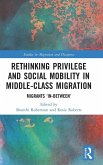Translocality, Entrepreneurship and Middle Class Across Eurasia is a comprehensive, multi-sited ethnography about the unfolding of capitalism across Eurasia and the advent of a new middle class since the late Soviet era.
Based on extensive fieldwork, the book follows three generations of ethnic Kyrgyz in three distinct eras and sites: The early bazaar traders of Novosibirsk (Russia), the post-2000 middlemen operating in Guangzhou (China) and the 'new entrepreneurs' who have emerged at home in Kyrgyzstan around 2015. The book advocates translocality as an innovative concept to better understand the dialectic of mobility and emplacement in contemporary livelihoods and value chains that transgress not only political borders, but also less tangible socio-cultural boundaries. Through this lens, the chapters forcefully demonstrate how ways of business-making align or conflict with notions of ethnic belonging, diaspora, sociability or gender, in and in-between various locations.
Proposing the imaginary of commercial journeys, the book documents the aspirations, adjustments and struggles of an emergent middle class, whose neoliberal subjectivity is inspired by a flexible entrepreneurial spirit of 'Kyrgyzness', and who navigate in a market environment that recently has been shifting towards more actor diversification, service orientation and rule-based formalization. This book will be of interest particularly to scholars in the fields of (economic) anthropology, post-socialist studies, migration, mobility and area studies with a focus on Central Asia and Eurasia.
Based on extensive fieldwork, the book follows three generations of ethnic Kyrgyz in three distinct eras and sites: The early bazaar traders of Novosibirsk (Russia), the post-2000 middlemen operating in Guangzhou (China) and the 'new entrepreneurs' who have emerged at home in Kyrgyzstan around 2015. The book advocates translocality as an innovative concept to better understand the dialectic of mobility and emplacement in contemporary livelihoods and value chains that transgress not only political borders, but also less tangible socio-cultural boundaries. Through this lens, the chapters forcefully demonstrate how ways of business-making align or conflict with notions of ethnic belonging, diaspora, sociability or gender, in and in-between various locations.
Proposing the imaginary of commercial journeys, the book documents the aspirations, adjustments and struggles of an emergent middle class, whose neoliberal subjectivity is inspired by a flexible entrepreneurial spirit of 'Kyrgyzness', and who navigate in a market environment that recently has been shifting towards more actor diversification, service orientation and rule-based formalization. This book will be of interest particularly to scholars in the fields of (economic) anthropology, post-socialist studies, migration, mobility and area studies with a focus on Central Asia and Eurasia.








